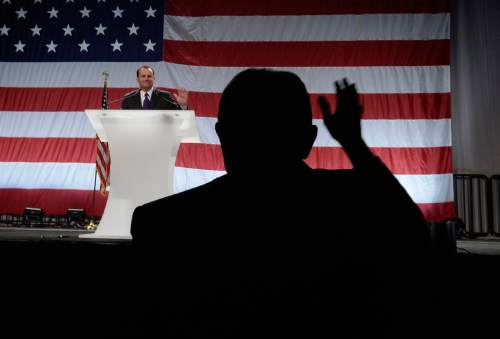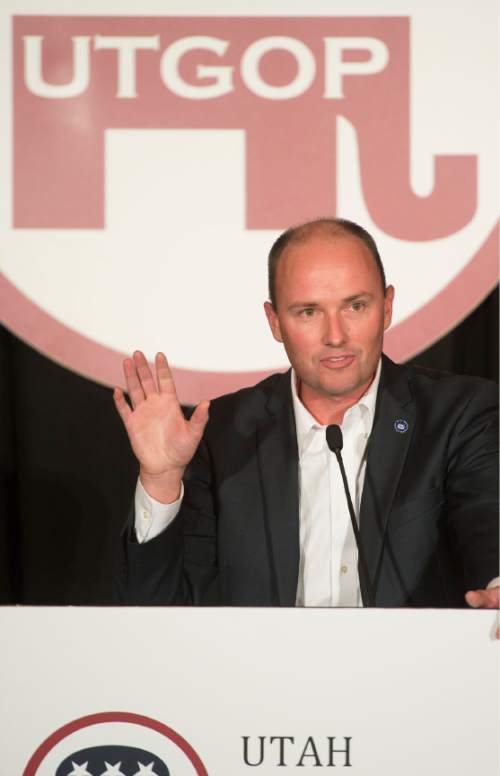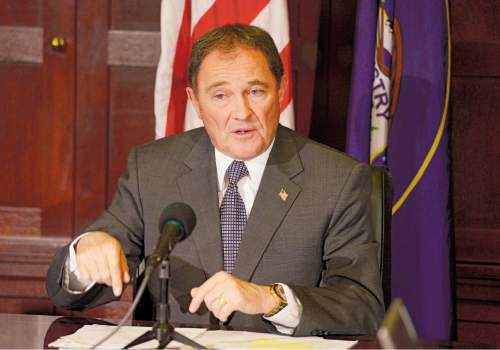This is an archived article that was published on sltrib.com in 2015, and information in the article may be outdated. It is provided only for personal research purposes and may not be reprinted.
Gov. Gary Herbert says that, in hindsight, he wishes he had vetoed a sweeping election overhaul that the Legislature passed in 2014 and instead let a grass-roots ballot initiative go forward.
Meanwhile, Lt. Gov. Spencer Cox, the state's top elections official, says that, unless the Utah Republican Party complies with the law and recognizes candidates who gather signatures to get a spot in the primary election, the party may be decertified and its candidates who go through the party conventions may not qualify for the ballot.
Speaking to members of the Republican State Central Committee over the weekend, Herbert said he has had a change of heart about SB54, the comprehensive rewrite of Utah's election system. The governor said he signed the bill because he thought it would preserve the convention system that has been in place in Utah for decades.
"Unfortunately, instead of uniting us all together, the change has created divisiveness with one lawsuit after another," Herbert's spokesman, Jon Cox, said Monday. "In hindsight, the governor believes the public should have voted on the Count My Vote petition to settle the issue once and for all."
The Legislature passed SB54 as part of a compromise with Count My Vote, a group of influential Utah politicos who sought to do away with the traditional system of letting party delegates nominate candidates at conventions.
They argued the system vested too much power in the hands of a small group of activists and produced delegates who did not represent mainstream Utah. Instead they wanted candidates to gather petition signatures to get on the ballot for a primary and let voters decide.
SB54 created a hybrid, a dual-track system in which candidates could gather signatures for a primary slot or go through the party conventions.
The Utah Republican Party, however, has balked, saying it has the authority to control its membership and nominees. The GOP plans to keep off the primary ballot candidates who only gather signatures.
The lieutenant governor, who is the state's top elections official, disagrees, and said in a letter to state Sen. Todd Weiler, R-Woods Cross, last week that, if the party refuses to accept signature-gathering candidates, it may lose its status as a recognized Qualified Political Party under the law.
If that happens, the state would not recognize candidates chosen at the party convention, meaning the only path to the party's nomination would be through signature-gathering.
Spencer Cox and Utah GOP Chairman James Evans have agreed that the best way to solve the disagreement would be to go to court and let a judge decide on the proper interpretation.
However, it's also possible that Herbert could call the Legislature into special session to clarify the matter and make a handful of other fixes to the law.
For example, because of a recent ruling by U.S. District Judge David Nuffer, Democratic primaries, which have traditionally been open to the state's 617,000 unaffiliated voters, will no longer be open to that group. The Republican Party has not allowed unaffiliated voters to vote in primaries and will continue to hold closed primaries after Nuffer's decision.
The ruling also means the required signature thresholds may need to be changed. Before, candidates could collect signatures from unaffiliated voters. But because those voters cannot vote in party primaries, they also cannot sign petitions for candidates seeking a spot on the ballot.
There have been ongoing discussions about changing the filing deadline for candidates who want to go the convention route and other technical corrections, as well.
Jon Cox, the governor's spokesman, said there are ongoing discussions about whether the governor will call a special session to make those changes before the Legislature convenes in its normal session in late January.
Twitter: @RobertGehrke







